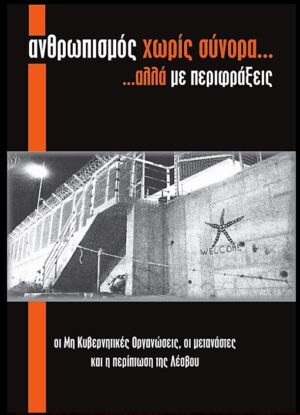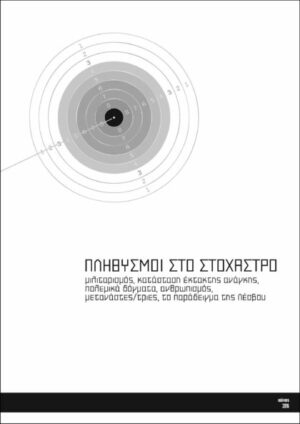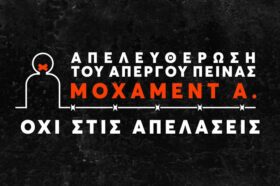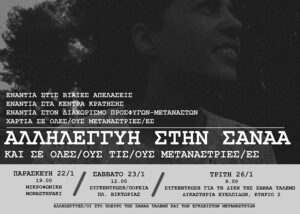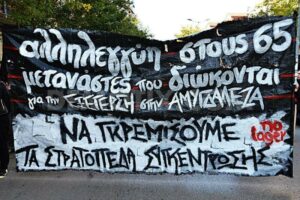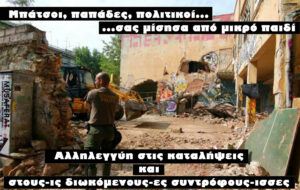Day 3 of the trial (Thursday April 26)
After the pause on Monday, the trial continued on Thursday April 26.
The court was adjourned with the deposition of the evidence documents from the defence advocates’ side. There was almost a problem with the request that was made by the lawyers to screen the videos that prove the actual events that took place on that day, as the seat of the court, while in the previous days had implied that they would be shown, on Thursday morning it seemed negative. The obstacle was overcome thanks to the persistence of the advocates to show at least some of them, in which one could see the attack of the riot police squads at the time of the arrest, and another one which proved that arrests were made even inside the containers, contrary to the testimonies of the cop witnesses.
After watching the head of the squad Stefopoulos guide us to Moria’s detention centre through showing some photos, then fragments of the two videos were shown. The result would make us understand that insisting to show the videos was futile, as in Greek courts the testimonies of cop perjurers carry more weight than facts that have been recorded on video.
After a brief pause, the court continued with the testimonies of the defence witnesses. In total, eight people testified, or rather tried to. During the examination of the witnesses, the desire of the court seat for speeding up the processes was made crystal clear, as was its insistence not to allow any witness to point out the context in which the migrant riots happened on that day, or the responsibility that the police carries for the unwarranted attack to the peaceful protest that happened on that day. This was made especially clear when a member of the solidarity assembly was called to testify and faced the furious attack of the prosecutor when he refused to testify what the prosecutor was pointing out to him. In this atmosphere of scorn and evident aggressiveness from the side of the court seat, almost all of the defence witnesses tried to highlight what really happened on July 18. Their testimonies, along with the use of audiovisual material that was handed in, could not leave any doubt about the timeline of the arrests as well as the police brutality, however, this proved to be of no importance at all.
For yet another day, there was no actual interpretation for the defendants, while during the testimony of the third English-speaking defence witness the judge finally understood that the interpreter for English could not translate a word, and was forced to replace her with a police officer who offered to take up the interpretation.
The day came to an end with the statements from the defendants, where the last defendant, who only speaks Wolof, had to call one of his co-defendants to do the interpretation, as the court had repeatedly chosen to ignore the request that was put forth for change of the interpreter that was brought from VIAL detention centre, as he spoke a different dialect than the one the defendants spoke.
Day 4 of the trial (Friday April 27)
On Friday the trial continued with the testimonies of the rest of the defendants. Since morning we could hear the desire of the court seat for this to be the final day of the trial, which was made clear by its stance during the testimonies of the defendants, where in many cases it wouldn’t let some of the defendants to testify everything they wished, and by the generally indifferent stance that it held towards the defendants during the whole process. All of the defendants talked about the beating they received during their arrest by the riot police as well as plainclothes policemen. Among the rest, they only non-black migrant testified, who referred to his arrest away from the Moria detention centre and the attempt to trap him through the false testimony of the fireman.
Without any pause, next came the oration of the prosecutor Spyridoula Stavrati who, through a crescento of fanfare concerning Greece in crisis, the famous DNA of hospitality that is found in Greeks since ancient times, and the commendable stance of the police, who do not beat migrants, but rather save them from the dinghies and stands next to the unaccompanied minors like a father figure, moved on to her contradicting proposals. We must admit that we were initially surprised when she proposed the full acquittal of three of the defendants that had been arrested by the firemen. Certainly, this could never be made possible had it not been for the monumental testimony of the fireman who identified the wrong people. The poor fireman who, according to the prosecutor, simply got confused and did not perjure himself. Next up, however, we returned to the tragedy of the court when the prosecutor, after proposing the acquittal from the charge of life-threatening arson, damage of foreign property and resistance for the rest of the defendants, as it was impossible to prove their involvement in these acts, she explained to us that they should be convicted for the offence of serious bodily harm.
And if that was to be expected by the prosecutor, the hope that both logic and moral gravity could at least be among the jury seemed to be a fright. Despite the suggestions made by the six defense advocates who thoroughly highlighted the unfounded allegations and the wretched detention conditions in which migrants are trapped on the islands, the court has fully accepted the prosecutor’s proposals. After another brief interruption, the headquarters returned to announce that together with the four jurors Michali Chriti, Spyro Kavoura, Dimitris Sitarenio and Smaragda Re decided unanimously the acquittal of the three arrested by the firemen and the conviction of the others for offence of serious bodily harm. Through some creative accounting of penalties, 32 were eventually sentenced to 26 months with a three-year suspension. This sentence was only 2 months above the 2-year limit allowing an appeal, and under the three years that allowed them to be released. Defendants have been appealed and a gradual release is expected for the 30 detained in custody for the past nine months. Defendants were appealed and the gradual release was expected for the 30 detained in the previous 9 months. Still, the vindictive mood of the state was seen as the defendants returned on Lesvos. By the time they reached on the island, at least 24 of them who have problems with asylum claims they have filed, have been taken to the deportation center within Moria which refers more to a prison than anything else.
No migrant alone in the face of judicial terrorism
Solidarity with the persecuted migrants from Moria and P. Ralli
Solidarity Assembly with the 35 Persecuted Migrants
#freethemoria35
Solidarity Call at Courthouse of Chios, for the support of the 10 persecuted migrants for the events that took place in Moria Detention Centre on July 10th.

